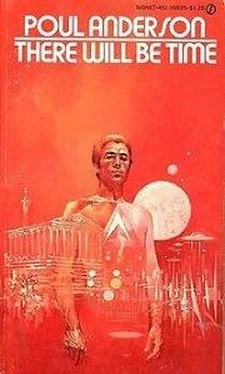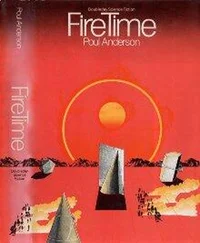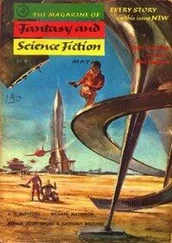Poul Anderson - There Will Be Time
Здесь есть возможность читать онлайн «Poul Anderson - There Will Be Time» весь текст электронной книги совершенно бесплатно (целиком полную версию без сокращений). В некоторых случаях можно слушать аудио, скачать через торрент в формате fb2 и присутствует краткое содержание. Год выпуска: 1972, Издательство: Doubleday, Жанр: Фантастика и фэнтези, на английском языке. Описание произведения, (предисловие) а так же отзывы посетителей доступны на портале библиотеки ЛибКат.
- Название:There Will Be Time
- Автор:
- Издательство:Doubleday
- Жанр:
- Год:1972
- ISBN:нет данных
- Рейтинг книги:5 / 5. Голосов: 1
-
Избранное:Добавить в избранное
- Отзывы:
-
Ваша оценка:
- 100
- 1
- 2
- 3
- 4
- 5
There Will Be Time: краткое содержание, описание и аннотация
Предлагаем к чтению аннотацию, описание, краткое содержание или предисловие (зависит от того, что написал сам автор книги «There Will Be Time»). Если вы не нашли необходимую информацию о книге — напишите в комментариях, мы постараемся отыскать её.
Nominated for Hugo Award for Best Novel in 1973.
There Will Be Time — читать онлайн бесплатно полную книгу (весь текст) целиком
Ниже представлен текст книги, разбитый по страницам. Система сохранения места последней прочитанной страницы, позволяет с удобством читать онлайн бесплатно книгу «There Will Be Time», без необходимости каждый раз заново искать на чём Вы остановились. Поставьте закладку, и сможете в любой момент перейти на страницу, на которой закончили чтение.
Интервал:
Закладка:
“No, thanks, I don’t smoke.”
Wallis stood for a moment before he said, emphatically rather than loudly, “I am the founder and master of this nation. We must have discipline, forms of respect. I’m called ‘sir.’ ”
Havig regarded him. Wallis was of medium height, blocky and powerful despite the paunch of middle life. His face was ruddy, somewhat flat-nosed, tufty-browed; gingery-gray mutton-chop whiskers crossed upper lip and cheeks to join the hair which fringed his baldness. He wore a black uniform, silver buttons and insignia, goldwork on the collar, epaulets, ornate dagger, automatic pistol. But there was nothing ridiculous about him. He radiated assurance. His voice rolled deep and compelling, well-nigh hypnotic when he chose. His small pale eyes never wavered.
“You realize,” Havig said at last, “this is all new and bewildering to me … sir.”
“Sure! Sure!” Wallis beamed and slapped him on the back.
“You’ll catch on fast. You’ll go far, my boy. No limit here, for a man who knows what he wants and has the backbone to go after it. And you’re an American, too. An honest-to-God American, from when our country was herself. Mighty few like that among us.”
He lowered himself behind the desk. “Sit down. No, wait a minute, see my liquor cabinet? I’ll take two fingers of the bourbon. You help yourself to what you like.”
Havig wondered why no provision for ice and soda and the rest had been made. It should have been possible. He decided Wallis didn’t use such additions and didn’t care that others might.
Seated in an armchair, a shot of rum between his fingers, he gazed at the Sachem and ventured: “I can go into detail about my biography, sir, but I think that could more usefully wait till I know what the Eyrie … is.”
“Right, right.” Wallis nodded his big head and puffed on the stogie. Its smoke was acrid. “However, let’s just get a few facts straight about you. Born in — 1933, did you say? Ever let on to anybody what you are?” Havig checked the impulse to mention me. The knowledgeable questions snapped: “Went back as a young man to guide your childhood? Went on to improve your station in life, and then to search for other travelers?”
“Yes, sir.”
“What do you think of your era?”
“Huh? Why, uh, well … we’re in trouble. I’ve gone ahead and glimpsed what’s in store. Sir.”
“Because of decay, Havig. You understand that, don’t you?” Intensity gathered like a thunderhead. “Civilized man turning against himself, first in war, later in moral sickness. The white man’s empires crumbling faster than Rome’s; the work of Clive, Bismarck, Rhodes, McKinley, Lyautey, all Indian fighters and Boers, everything that’d been won, cast out in a single generation; pride of race and heritage gone; traitors-Bolsheviks and international Jews-in the seats of power, preaching to the ordinary white man that the wave of the future was black. I’ve seen that, studying your century. You, living in it, have you seen?”
Havig bristled. “I’ve seen what prejudice, callousness, and stupidity bring about. The sins of the fathers are very truly visited on the Sons.”
Walls chose to ignore the absence of an honorific. Indeed, he smiled and grew soothing: “I know. I know. Don’t get me wrong. Plenty of colored men are fine, brave fellows-Zulus, for instance, or Apache Indians to take a different race, or Japs to take still another. Any travelers we may find among them will get their chance to occupy the same honored position as all our proven time agents do, as you will yourself, I’m sure. Shucks, I admire your Israelis, what I’ve heard about them. A mongrel people, racially no relation to the Hebrews of the Bible, but tough fighters and clever. No, I’m just talking about the need for everybody to keep his own identity and pride. And I’m only mad at those classes it’s fair to call niggers, redskins, Chinks, kikes, wops, you know what I mean. Plenty of pure-blooded whites among them, I’m sorry to say, who’ve either lost heart or have outright sold themselves to the enemy.”
Havig forced himself to remember that that basic attitude was common, even respectable in the Sachem’s birth-century. Why, Abraham Lincoln had spoken of the inborn inferiority of the Negro … He didn’t suppose Wallis ordered crucifixions.
“Sir,” he said with much care, “I suggest we avoid argument till we’ve made the terms of our thinking clear to each other. That may take a lot of effort. Meanwhile we can better discuss practical matters.”
“Right, right,” Wallis rumbled. “You’re a brain, Havig. A man of action, too, though maybe within limits. But I’ll be frank, brains are what we need most at this stage, especially if they have scientific training, realistic philosophies.” He waved the cigar. “Take that haul today from Jerusalem. Typical! The Brabanter and the Greek we can probably train up to be useful fighting men, scouts, auxiliaries on time expeditions, that sort of thing. But the rest—” He clicked his tongue. “I don’t know. Maybe, at most, ferrymen, fetching stuff from the past. And I can only hope the woman'll be a breeder.”
“What?” Havig started half out of his chair. It leaped inside him. “We can have children?”
“With each other, yes. In the course of a hundred years we’ve proved that.” Wallis guffawed. “Not with non-travelers, no, not ever. We’ve proved that even oftener. How’d you like a nice little servant girl to warm your bed tonight, hm? Or we have slaves, taken on raids — and don’t go moralistic on me. Their gangs would’ve done the same to us, and if we didn’t bring prisoners back here and tame them, rather than cut their throats, they and their brats would go on making trouble along our borders.” His mood had reverted to serious. “Quite a shortage of traveler women here, as you’d expect, and not all of them willing or able to become mothers. But those who do — The kids are ordinary, Havig. The gift is not inherited.”
Considering the hypothesis he had made (how far ago on his multiply twisted world line?), the younger man was unsurprised. If two such sets of chromosomes could interact to make a life, it must be because the resonances (?) which otherwise barred fertility were canceled out.
“Well, then, no use trying to breed a race from ourselves,” Wallis continued wistfully. “Oh, we do give our kids educations, preference, leadership jobs when they’re grown. I have to allow that, it being one thing which helps keep my agents loyal to me. But frankly, confidentially, I’m often hard put to find handsome-looking posts where somebody’s get can do no harm. Because the parents are time travelers, it doesn’t follow they’re not chuckle-heads fit only to bring forth more chuckle-heads. No, we’re a kind of aristocracy in these parts, I won’t deny, but we can’t keep it hereditary for very long. I wouldn’t want that anyway.”
Havig asked softly: “What do you want, sir?”
Wallis put aside his cigar and drink, as if his next words required the piety of folded hands on the desk before him. “To restore civilization. Why else did God make our kind?”
“But — in the future — I’ve glimpsed—”
“The Maurai Federation?” Fury flushed the wide countenance. A fist thudded down. “How much of it have you seen? Damn little, right? I’ve explored that epoch, Havig. You’ll be taken to learn for yourself. I tell you, they’re a bunch of Kanaka-white-nigger-Chink-Jap mongrels who’ll come to power — are starting to come to power while we sit here — for no other reason than that they were less hard-hit. They’ll work, and fight, and bribe, and connive to dominate the world, only so they can put bridle and saddle on the human race in general, the white race in particular, and stop progress forever. You’ll see! You’ll see!”
Читать дальшеИнтервал:
Закладка:
Похожие книги на «There Will Be Time»
Представляем Вашему вниманию похожие книги на «There Will Be Time» списком для выбора. Мы отобрали схожую по названию и смыслу литературу в надежде предоставить читателям больше вариантов отыскать новые, интересные, ещё непрочитанные произведения.
Обсуждение, отзывы о книге «There Will Be Time» и просто собственные мнения читателей. Оставьте ваши комментарии, напишите, что Вы думаете о произведении, его смысле или главных героях. Укажите что конкретно понравилось, а что нет, и почему Вы так считаете.












